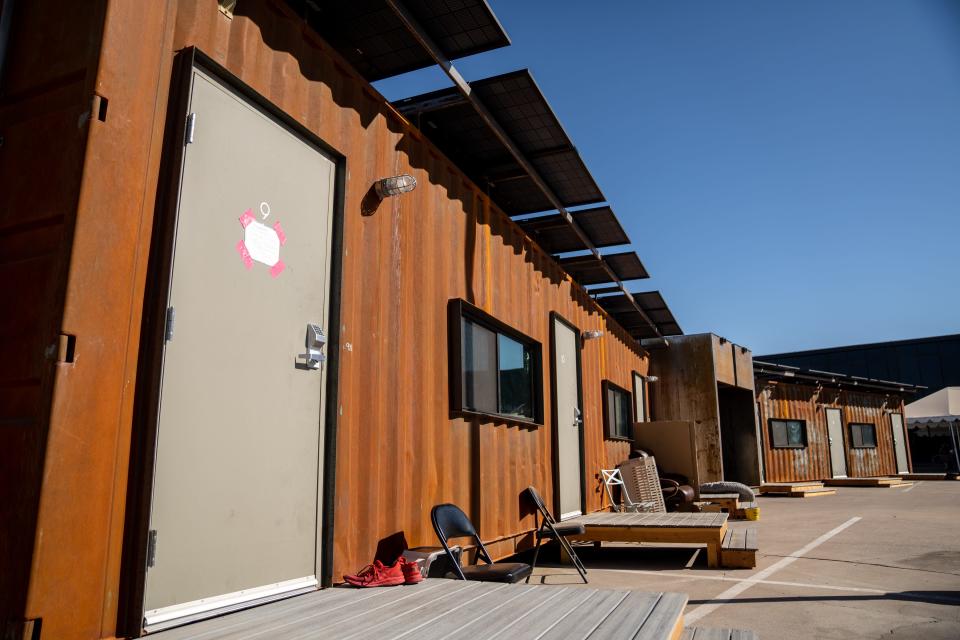Get sober and then find shelter? That's no real way to handle Phoenix homelessness
Living outdoors in Phoenix is dangerous.
Now imagine being reliant on drugs for months or years and being told you can get free or affordable housing — but you must detox from drugs first. Without a safe space and support system, most fail to do so.
That is why, though some lawmakers advocate for one, a treatment-first policy cannot be our lead strategy.
The Housing First model offers shelter up front.
It provides a safe place to sleep, a clean bathroom, a shower and air conditioning. Care workers come by daily offering help finding a job and offering treatment — at your pace and with specialized services.
We ignore root causes of homelessness
It’s a far more compassionate and effective model that understands the trauma that comes with being unsheltered. This is why cities throughout Arizona, including Phoenix and Tucson, prioritize this homelessness strategy.
It’s no question that homelessness in Arizona is on the rise and one of the top crises we must address with every tool in our arsenal.
We’re bandaging this crisis with new shelter beds instead of addressing root reasons: unlivable wages, no quality health care and a massive housing shortage.
Rents increased by more than 35% in the Phoenix area between 2021 and 2022. During that same period, Arizona's homeless population increased by 23%.
Wages have largely remained the same, accelerating the number of evictions we’re seeing (there were more than 7,000 in Phoenix each month this summer) and resulting in more and more Arizonans living on our streets.
1 shelter helped more than 600 in a year

In Phoenix, we’ve made enormous efforts to provide more shelter and affordable housing in the past few years. Since June 2021, we’ve invested more than $140 million to help the homeless, opening 1,072 shelter beds in 2022-2023 and building an additional 790 in 2024-25.
We’ve also seen success with our housing-first model.
This includes the Washington Street Shelter operated by St. Vincent de Paul, where after just a year more than 600 leave with a positive outcome — meaning they have been housed, reunited with family or placed from a congregate setting to a non-congregant shelter.
We’ve assisted partners like Community Bridges Inc. to purchase hotels for emergency and transitional housing. Cities like Mesa and Scottsdale saw the success of these efforts and decided to follow suit.
Scottsdale mayor: How we handle homelessness at a hotel
Our facilities do not allow drug or alcohol use on-site, and never have. But we also do not require individuals to prove that they are not using drugs to provide them lodging.
Opponents oversimplify drug use, mental health
Housing-first opponents often oversimplify and say that drugs or mental health are what causes individuals to become homeless.
They believe that if you take the drugs away completely and require treatment to receive services, we’ll see greater success.
That is not the case. Many turn to drugs after living on the streets for months or years — including to stay awake at night for their own safety.
Studies have shown that Housing First models have higher retention rates.
Individuals who suffer from substance abuse are far less likely to accept services if complete abstinence is required before receiving shelter or housing.
Yet many individuals who are placed in a stable housing situation are more likely to accept treatment and get sober.
Don't dismantle Housing First. It works
With a secure place to live, individuals are better able to access health care services, maintain medication routines and focus on their overall health and well-being.
Dismantling an entire model without a replacement, pulling needed funding for housing interventions and criminalizing homelessness is not the answer.
Housing First isn’t perfect — nothing is perfect. But everyone deserves safe housing.
Cities, with state support, have been leading Arizona’s efforts to house our residents, and we will continue to do so with a model that has proven, compassionate success.
Vice Mayor Yassamin Ansari represents District 7 in Phoenix, including the area around the Human Services Campus. Joselyn Wilkinson is the director of statewide capacity building at the Arizona Housing Coalition and sits on Governor Hobbs’s Interagency and Community Council on Homelessness and Housing. Reach them at council.district.7@phoenix.gov and joselyn@azhousingcoalition.org.
This article originally appeared on USA TODAY: Housing First isn't perfect, but it's the best solution for Phoenix

